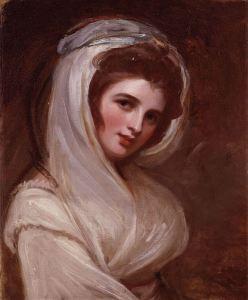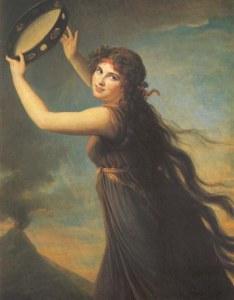A cleaner, sweeter bed-fellow does not exist. – Greville’s letter praising Emma to Lord Hamilton
When Mandy Rice-Davies compared herself to Lady Hamilton, Lord Nelson’s mistress, it is doubtful that any of the reporters who made her famous for the reference had any confusion about what she meant. But the 1960s were a more sexually honest time than our own, and nowadays writers are even more likely to prevaricate about Lady Hamilton’s harlotry than they are about Rice-Davies’; a BBC article on the famous affair even goes so far as to say that “[Nelson and Hamilton] had fallen out of love with their partners”, as if the Lady had married her patron due to “falling in love” in the first place. In fact, there’s another modern term for the way they came to be together, more pejorative even than “prostitution”; read on and you’ll see what I mean.
 Amy Lyon, the daughter of a blacksmith named Henry Lyon and his wife Mary, was born on April 26th, 1765 in Cheshire, England. Her father died when she was an infant and her mother raised her alone, later sending her to live with her grandmother in Wales. At twelve she started working as a maid and soon met another maid named Jane Powell, who aspired to be an actress; through her Amy found work at the Drury Lane theatre as a maid to several actresses, during which time she lived in the home of a brothel madam named Mrs. Kelly. Her beauty and grace attracted the attention of James Graham, the doctor who owned an establishment called the “Temple of Health and Hymen” where couples could pay £50 a night (over £3000 today) to have sex in the “Celestial Bed”, which administered mild electric shocks that were supposed to cure infertility and encourage the conception of “perfect” babies. Amy’s job was to be a hostess, model and erotic dancer, presumably to augment the effects of the electric bed. When she was sixteen she was hired by Sir Harry Featherstonhaugh to provide entertainment at a several-months-long standing party; she is known to have danced nude on the dining room table at this shindig, and her other activities may be guessed by the fact that she was pregnant by the end of the summer, presumably by Sir Harry.
Amy Lyon, the daughter of a blacksmith named Henry Lyon and his wife Mary, was born on April 26th, 1765 in Cheshire, England. Her father died when she was an infant and her mother raised her alone, later sending her to live with her grandmother in Wales. At twelve she started working as a maid and soon met another maid named Jane Powell, who aspired to be an actress; through her Amy found work at the Drury Lane theatre as a maid to several actresses, during which time she lived in the home of a brothel madam named Mrs. Kelly. Her beauty and grace attracted the attention of James Graham, the doctor who owned an establishment called the “Temple of Health and Hymen” where couples could pay £50 a night (over £3000 today) to have sex in the “Celestial Bed”, which administered mild electric shocks that were supposed to cure infertility and encourage the conception of “perfect” babies. Amy’s job was to be a hostess, model and erotic dancer, presumably to augment the effects of the electric bed. When she was sixteen she was hired by Sir Harry Featherstonhaugh to provide entertainment at a several-months-long standing party; she is known to have danced nude on the dining room table at this shindig, and her other activities may be guessed by the fact that she was pregnant by the end of the summer, presumably by Sir Harry.
As was typical in those days, Sir Harry blamed the pregnancy entirely on Amy, so though he was still supporting her she decided to become the kept woman of Charles Francis Greville, an MP and the second son of the first Earl of Warwick. Though Greville was in love with Amy, he was quite domineering and appears to have viewed her as a piece of property. When the baby, who was given the name Emma Carew, was born, he sent her away to be raised by a couple named Blackburn; around this same time he also demanded that Amy change her own name to Emma, specifically “Emma Hart”. When he had her portrait painted by his friend George Romney, the painter became obsessed with her; he made so many sketches of her (both nude and clothed) at this time and later that he was able to paint a number of portraits of her without further sitting. Because Romney was a popular painter, Emma became well-known in London society both for her wit and personality and as an artist’s model.
Unfortunately, Greville spent far beyond his means, and by 1783 he needed a new source of funds; he decided to acquire them by marrying the young heiress Henrietta Middleton, but since it was common knowledge that Emma was his lover he had to be rid of her. He therefore convinced his uncle, Sir William Hamilton, to accept her as his mistress. Hamilton was an art collector, and no doubt viewed the now-famous beauty as a valuable find; he also wanted to facilitate his nephew’s marriage so as to eliminate his frequent requests for money. The deal was therefore made without Emma’s input or knowledge, and she was shipped off to Naples (where Hamilton was the British envoy) under the guise of a six-month holiday while Greville was supposedly away on business. She was, in other words, “sex trafficked”, sent from one owner to another in a different country.
 But though Emma was furious upon discovering what was really expected of her, she eventually adapted to her situation. Hamilton’s home was beautiful and his art collection renowned, and he was a widower who, far from viewing her as an embarrassment, instead encouraged her modeling, singing and other performance. The form for which she became known was called “attitudes”; this consisted of an act in which she would wear a simple gown dressed up by scarves and shawls which helped her to evoke images from history and classical mythology by posing. The audience was then supposed to guess who she was portraying. Though this may sound a bit silly to modern ears, the effect was apparently very striking; Johann Wolfgang von Goethe wrote, “The performance is like nothing you have ever seen before. With a few scarves and shawls she expressed a variety of wonderful transformations. One pose after another without a break”. Within a few years of her first performance in the spring of 1787, a number of other actresses took up the art; over the years Emma herself evolved from mere posing into acting out short pantomimes, most famously portraying Medea.
But though Emma was furious upon discovering what was really expected of her, she eventually adapted to her situation. Hamilton’s home was beautiful and his art collection renowned, and he was a widower who, far from viewing her as an embarrassment, instead encouraged her modeling, singing and other performance. The form for which she became known was called “attitudes”; this consisted of an act in which she would wear a simple gown dressed up by scarves and shawls which helped her to evoke images from history and classical mythology by posing. The audience was then supposed to guess who she was portraying. Though this may sound a bit silly to modern ears, the effect was apparently very striking; Johann Wolfgang von Goethe wrote, “The performance is like nothing you have ever seen before. With a few scarves and shawls she expressed a variety of wonderful transformations. One pose after another without a break”. Within a few years of her first performance in the spring of 1787, a number of other actresses took up the art; over the years Emma herself evolved from mere posing into acting out short pantomimes, most famously portraying Medea.
Sir William eventually married Emma on September 6th, 1791; he was sixty and she twenty-six. The match gave her the title by which she was forever known afterward, though friends still called her “Emma”. It also gave her the duties of a diplomat’s wife, among them entertaining Horatio Nelson (then a mere post captain) when he came in 1793 to request reinforcements from the King of Naples. By the time he returned in 1798 he had lost an arm, an eye, most of his teeth and the majority of his health, but had won both the Battle of the Nile and worldwide fame. Sir William invited the great man to recuperate in their home, nursed by his young wife, and it was at this time that the two began their affair.
But while one might think this a betrayal of hospitality, the truth is that Sir William definitely knew about and seems to have even encouraged the affair; he and Nelson respected and admired one another, and Emma and Nelson had similar feelings for one another. Indeed, the relationship soon developed into a ménage a trois; after the Neopolitan Revolution of 1799 the ailing Hamilton was allowed to retire and return to England, accompanied by Nelson, who openly moved in with the Hamiltons despite having a home (and wife) of his own. In fact, the arrangement became such a huge scandal that the Admiralty ordered Nelson back to sea to keep him away from Emma. The public, however, was fascinated and the Hamiltons seemed completely unconcerned with what anyone said; when Emma gave birth to a daughter on January 31st, 1801 she named her “Horatia”, flagrantly advertising her paternity.
 Alas, their happiness was not to last long. Sir William, whom Emma had grown to love, died in 1803 and Nelson returned to sea to fight Napoleon soon afterward. The daughter Emma was carrying at the time died soon after her birth early the next year, and she consoled herself by gambling and otherwise wasting money; when Nelson died at Trafalgar in October of 1805, she had nothing left but Hamilton’s £800/year pension, which she exhausted trying to build up Merton Place (the house Nelson had bought for the three to live together in) as a monument to the great man. Now the government decided to have its revenge on the woman it considered a double embarrassment for tarnishing the reputations of two of its favored sons: Emma was barred from Nelson’s funeral, and his request that she and Horatia be provided for was totally ignored; money and gifts were instead showered upon Nelson’s widow, brother and other family members. As her looks and figure were long gone, Emma could no longer attract a patron; she fell deeply into debt and after Nelson’s love letters to her were stolen and published in 1814, the government exacted one more act of petty vengeance by throwing her into debtor’s prison. After her release that autumn she fled to France with Horatia, where she died on January 15th, 1815. Men in power are never kind to women who have embarrassed them, and neither Lady Hamilton’s title nor the exalted reputation of her most famous lover could save her from being treated like any other troublesome whore.
Alas, their happiness was not to last long. Sir William, whom Emma had grown to love, died in 1803 and Nelson returned to sea to fight Napoleon soon afterward. The daughter Emma was carrying at the time died soon after her birth early the next year, and she consoled herself by gambling and otherwise wasting money; when Nelson died at Trafalgar in October of 1805, she had nothing left but Hamilton’s £800/year pension, which she exhausted trying to build up Merton Place (the house Nelson had bought for the three to live together in) as a monument to the great man. Now the government decided to have its revenge on the woman it considered a double embarrassment for tarnishing the reputations of two of its favored sons: Emma was barred from Nelson’s funeral, and his request that she and Horatia be provided for was totally ignored; money and gifts were instead showered upon Nelson’s widow, brother and other family members. As her looks and figure were long gone, Emma could no longer attract a patron; she fell deeply into debt and after Nelson’s love letters to her were stolen and published in 1814, the government exacted one more act of petty vengeance by throwing her into debtor’s prison. After her release that autumn she fled to France with Horatia, where she died on January 15th, 1815. Men in power are never kind to women who have embarrassed them, and neither Lady Hamilton’s title nor the exalted reputation of her most famous lover could save her from being treated like any other troublesome whore.
